北京集训:20180311
于是今天又是一场愉悦的考试。
笨蒟蒻今天终于不爆零啦!好开心!
T1:
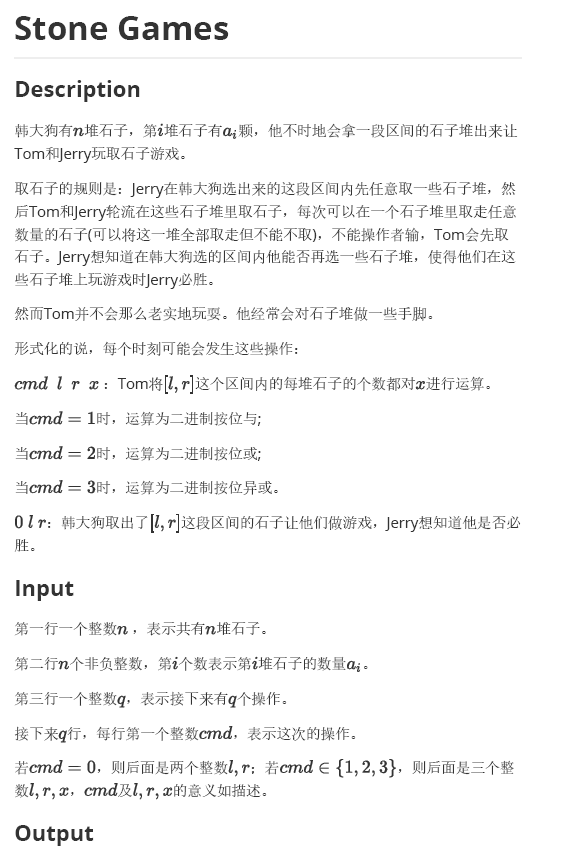
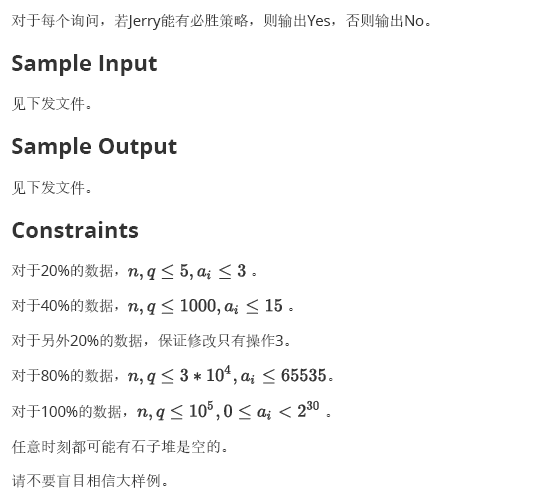

说白了就是要在区间内选出一个子集使之xor和为0。
直觉告诉我这东西线段树。
然而三种标记没法合并啊,怎么办啊......
莫队吧,区间修改不可做。
看80分的值域那么小,要不然,我们来倍增沃尔什变换吧。
不不不,这是什么鬼畜的东西......
算了,40分值域才15,n^2暴力+bitset可过。
好像能线性基?然而40分不需要线性基的,算了不管了暴力了。
然后下来发现大力线性基有80分......
说下正解:
显然当r-l+1>30的时候一定输出Yes(这不显然啊,我怎么没想出来)。
为什么?考虑线性基的插入过程,我们逐个插入,当某个数不能被插入时说明xor出0,符合要求。
而值域10^9代表线性基最多插30个,根据鸽巢原理,当你插入第31个数的时候要么无法插入,要么前面已经插入出0了。
然后我们当r-l+1<=30的时候大力计算即可。
所以我们有了完美的n^2暴力,能过80分。
剩下的20分怎么办呢?考虑用线段树维护修改。
还是老问题,这个标记没法合并。
你可以线段树强行push,显然这样是O(n^2)的,而且是大常数。
其实暴力推倒(不是这个字吧)一下是可以合并的,然而我比较蒻,不愿意推(H是不行的)。
于是我选择按位考虑,or变成数字为1的位强制是1,and变成数字为0位强制是0,xor变成区间01互换。
好的,我们可以每个节点开31个char去维护这个东西是吧......
然后就有了一个常数巨大的伪正解。
考场40分代码:

1 #include<bits/stdc++.h> 2 #define debug cout 3 using namespace std; 4 const int maxn=1e3+1e2,maxe=64,maxl=32; 5 typedef bitset<maxe> BitSet; 6 7 int in[maxn],n; 8 BitSet prv[maxn]; 9 10 inline BitSet trans(const BitSet &sou,const int &x) { 11 BitSet ret = sou; 12 for(int i=0;i<maxl;i++) if( sou[i] ) ret[i^x] = 1; 13 return ret; 14 } 15 16 inline void getprv(int l,int r) { 17 prv[l] &= 0; prv[l][in[l]] = 1; 18 for(int i=l+1;i<=r;i++) prv[i] = trans(prv[i-1],in[i]) , prv[i][in[i]] = 1; 19 } 20 inline bool getans(int l,int r) { 21 if( !in[l] ) return 1; 22 for(int i=l+1;i<=r;i++) if( !in[i] || prv[i-1][in[i]] ) return 1; 23 return 0; 24 } 25 26 inline void modify(int l,int r,int x,int o) { 27 if( o == 1 ) for(int i=l;i<=r;i++) in[i] &= x; 28 if( o == 2 ) for(int i=l;i<=r;i++) in[i] |= x; 29 if( o == 3 ) for(int i=l;i<=r;i++) in[i] ^= x; 30 } 31 32 int main() { 33 static int q; 34 scanf("%d",&n); 35 for(int i=1;i<=n;i++) scanf("%d",in+i); 36 scanf("%d",&q); 37 for(int i=1,o,l,r,x;i<=q;i++) { 38 scanf("%d%d%d",&o,&l,&r); 39 if( !o ) { 40 getprv(l,r); 41 puts(getans(l,r)?"Yes":"No"); 42 } else { 43 scanf("%d",&x); 44 modify(l,r,x,o); 45 } 46 } 47 return 0; 48 }
暴力线段树80分代码:

1 #include<iostream> 2 #include<cstdio> 3 #include<cstring> 4 #include<cctype> 5 #define debug cerr 6 using namespace std; 7 const int maxn=1e5+1e2,maxl=32; 8 9 int in[maxn],n; 10 struct SegmentTree { 11 int l[maxn<<2],r[maxn<<2],lson[maxn<<2],rson[maxn<<2],cnt; 12 int lazy[maxn<<2][3]; // 0 xor , 1 and , 2 or . 13 14 inline void getpe(int tpe,int &reta,int &retb) { 15 if( tpe == 0 ) reta = 1 , retb = 2; 16 else if( tpe == 1 ) reta = 0 , retb = 2; 17 else if( tpe == 2 ) reta = 0 , retb = 1; 18 } 19 inline void apply(int pos,int val,int tpe) { 20 if( l[pos] == r[pos] ) { 21 if( tpe == 0 ) in[l[pos]] ^= val; 22 if( tpe == 1 ) in[l[pos]] &= val; 23 if( tpe == 2 ) in[l[pos]] |= val; 24 } 25 int ta,tb; getpe(tpe,ta,tb); 26 if( ~lazy[pos][ta] || ~lazy[pos][tb] ) push(pos); 27 if( !~lazy[pos][tpe] ) lazy[pos][tpe] = val; 28 else { 29 if( tpe == 0 ) lazy[pos][tpe] ^= val; 30 if( tpe == 1 ) lazy[pos][tpe] &= val; 31 if( tpe == 2 ) lazy[pos][tpe] |= val; 32 } 33 } 34 inline void push(int pos) { 35 if( l[pos] == r[pos] ) return; 36 for(int i=0;i<3;i++) 37 if( ~lazy[pos][i] ) { 38 apply(lson[pos],lazy[pos][i],i) , 39 apply(rson[pos],lazy[pos][i],i) ; 40 lazy[pos][i] = -1; 41 } 42 } 43 inline void build(int pos,int ll,int rr) { 44 l[pos] = ll , r[pos] = rr; 45 if( ll == rr ) return; 46 const int mid = ( ll + rr ) >> 1; 47 build(lson[pos]=++cnt,ll,mid) , 48 build(rson[pos]=++cnt,mid+1,rr) ; 49 } 50 inline void update(int pos,int ll,int rr,int val,int tpe) { 51 if( ll <= l[pos] && r[pos] <= rr ) return apply(pos,val,tpe); 52 const int mid = ( l[pos] + r[pos] ) >> 1; 53 push(pos); 54 if( rr <= mid ) return update(lson[pos],ll,rr,val,tpe); 55 if( ll > mid ) return update(rson[pos],ll,rr,val,tpe); 56 update(lson[pos],ll,rr,val,tpe) , update(rson[pos],ll,rr,val,tpe); 57 } 58 inline int query(int pos,int tar) { 59 if( l[pos] == r[pos] ) return in[l[pos]]; 60 const int mid = ( l[pos] + r[pos] ) >> 1; 61 push(pos); 62 if( tar <= mid ) return query(lson[pos],tar); 63 else return query(rson[pos],tar); 64 } 65 SegmentTree() { 66 memset(lazy,-1,sizeof(lazy)); 67 } 68 }segt; 69 70 struct LinerBase { 71 int dat[maxl]; 72 inline bool insert(int x) { 73 for(int i=31;~i;i--) 74 if( x & ( 1 << i ) ) { 75 if( dat[i] ) x ^= dat[i]; 76 else { 77 dat[i] = x; 78 return 1; 79 } 80 } 81 return 0; 82 } 83 inline void reset() { 84 memset(dat,0,sizeof(dat)); 85 } 86 }lb; 87 88 inline bool query(int l,int r) { 89 if( r - l + 1 > 30 ) return 1; 90 lb.reset(); 91 for(int i=l,q;i<=r;i++) { 92 q = segt.query(1,i); 93 if( !lb.insert(q) ) return 1; 94 } 95 return 0; 96 } 97 98 __inline char nxtchar() { 99 return getchar(); 100 static const int BS = 1 << 21; 101 static char buf[BS],*st=buf+BS,*ed=buf+BS; 102 if( st == ed ) ed = buf + fread(st=buf,1,BS,stdin); 103 return st == ed ? -1 : *st++; 104 } 105 __inline int getint() { 106 int ret = 0 , ch; 107 while( !isdigit(ch=nxtchar()) ); 108 do ret=ret*10+ch-'0'; while( isdigit(ch=nxtchar()) ); 109 return ret; 110 } 111 112 113 int main() { 114 static int m; 115 n = getint(); 116 for(int i=1;i<=n;i++) in[i] = getint(); 117 segt.build(segt.cnt=1,1,n); 118 m = getint(); 119 for(int i=1,o,l,r,x;i<=m;i++) { 120 o = getint() , l = getint() , r = getint(); 121 if( !o ) puts(query(l,r)?"Yes":"No"); 122 else { 123 x = getint() , o %= 3; 124 segt.update(1,l,r,x,o); 125 } 126 } 127 return 0; 128 }
正解代码:

1 #pragma GCC optimize(3) 2 #include<cstdio> 3 #include<cstring> 4 #include<cctype> 5 const int maxn=1e5+1e2,maxl=32; 6 7 unsigned in[maxn]; 8 int n; 9 struct SegmentTree { 10 int l[maxn<<2],r[maxn<<2],lson[maxn<<2],rson[maxn<<2],cnt; 11 struct Node { 12 char dat[maxl]; 13 char& operator [] (const int &x) { 14 return dat[x]; 15 } 16 inline bool empty() { 17 for(int i=0;i<maxl;i++) if( ~dat[i] ) return 0; 18 return 1; 19 } 20 inline void reset() { 21 memset(dat,-1,sizeof(dat)); 22 } 23 inline unsigned build() { 24 unsigned ret = 0; 25 for(int i=0;i<maxl;i++) { 26 //if( !~dat[i] ) throw "You shouldn't build this ."; ??? 27 ret |= ( (unsigned) dat[i] << i ); 28 } 29 return ret; 30 } 31 inline void fill(unsigned x) { 32 for(int i=0;i<maxl;i++) dat[i] = ( x >> i ) & 1; 33 } 34 Node() { 35 memset(dat,-1,sizeof(dat)); 36 } 37 }ns[maxn<<2],lazy[maxn<<2]; // lazy = 1 means fill 1 , lazy = 0 means fill 0 , lazy = 2 means neg , lazy = -1 means nothing to do . 38 inline void apply(int pos,Node &sou) { 39 for(int i=0;i<maxl;i++) if( ~sou[i] ) { 40 if( sou[i] != 2 ) ns[pos][i] = lazy[pos][i] = sou[i]; 41 else { 42 ns[pos][i] ^= 1; 43 if( !~lazy[pos][i] ) lazy[pos][i] = 2; 44 else if( lazy[pos][i] == 2 ) lazy[pos][i] = -1; 45 else lazy[pos][i] ^= 1; 46 } 47 } 48 } 49 inline void push(int pos) { 50 if( l[pos] == r[pos] || lazy[pos].empty() ) return; 51 apply(lson[pos],lazy[pos]) , 52 apply(rson[pos],lazy[pos]) ; 53 lazy[pos].reset(); 54 } 55 inline void build(int pos,int ll,int rr) { 56 l[pos] = ll , r[pos] = rr; 57 if( ll == rr ) return ns[pos].fill(in[ll]); 58 const int mid = ( ll + rr ) >> 1; 59 build(lson[pos]=++cnt,ll,mid) , 60 build(rson[pos]=++cnt,mid+1,rr) ; 61 } 62 inline void update(int pos,int ll,int rr,Node &o) { 63 if( ll <= l[pos] && r[pos] <= rr ) return apply(pos,o); 64 const int mid = ( l[pos] + r[pos] ) >> 1; 65 push(pos); 66 if( rr <= mid ) return update(lson[pos],ll,rr,o); 67 if( ll > mid ) return update(rson[pos],ll,rr,o); 68 update(lson[pos],ll,rr,o) , update(rson[pos],ll,rr,o); 69 } 70 inline unsigned query(int pos,int tar) { 71 if( l[pos] == r[pos] ) return ns[pos].build(); 72 const int mid = ( l[pos] + r[pos] ) >> 1; 73 push(pos); 74 if( tar <= mid ) return query(lson[pos],tar); 75 else return query(rson[pos],tar); 76 } 77 SegmentTree() { 78 memset(lazy,-1,sizeof(lazy)); 79 } 80 }segt; 81 82 struct LinerBase { 83 unsigned dat[maxl]; 84 inline bool insert(unsigned x) { 85 for(int i=31;~i;i--) 86 if( x & ( 1 << i ) ) { 87 if( dat[i] ) x ^= dat[i]; 88 else { 89 dat[i] = x; 90 return 1; 91 } 92 } 93 return 0; 94 } 95 inline void reset() { 96 memset(dat,0,sizeof(dat)); 97 } 98 }lb; 99 100 inline bool query(int l,int r) { 101 if( r - l + 1 > 30 ) return 1; 102 lb.reset(); 103 for(int i=l,q;i<=r;i++) { 104 q = segt.query(1,i); 105 if( !lb.insert(q) ) return 1; 106 } 107 return 0; 108 } 109 110 inline SegmentTree::Node getnode(const unsigned &x,const int o) { 111 SegmentTree::Node ret; 112 if( !o ) { 113 for(int i=0;i<maxl;i++) if( ( x >> i ) & 1 ) ret[i] = 2; 114 } else if( o == 1 ) { 115 for(int i=0;i<maxl;i++) if( ! ( ( x >> i ) & 1 ) ) ret[i] = 0; 116 } else if( o == 2 ) { 117 for(int i=0;i<maxl;i++) if( ( x >> i ) & 1u ) ret[i] = 1; 118 } 119 return ret; 120 } 121 122 inline char nxtchar() { 123 static const int BS = 1 << 21; 124 static char buf[BS],*st=buf+BS,*ed=buf+BS; 125 if( st == ed ) ed = buf + fread(st=buf,1,BS,stdin); 126 return st == ed ? -1 : *st++; 127 } 128 inline int getint() { 129 int ret = 0 , ch; 130 while( !isdigit(ch=nxtchar()) ); 131 do ret=ret*10+ch-'0'; while( isdigit(ch=nxtchar()) ); 132 return ret; 133 } 134 135 136 int main() { 137 static int m; 138 static unsigned x; 139 static SegmentTree::Node ONode; 140 n = getint(); 141 for(int i=1;i<=n;i++) in[i] = getint(); 142 segt.build(segt.cnt=1,1,n); 143 m = getint(); 144 for(int i=1,o,l,r;i<=m;i++) { 145 o = getint() , l = getint() , r = getint(); 146 if( !o ) puts(query(l,r)?"Yes":"No"); 147 else { 148 x = getint() , o %= 3; 149 ONode = getnode(x,o); 150 segt.update(1,l,r,ONode); 151 } 152 } 153 return 0; 154 }
T2:
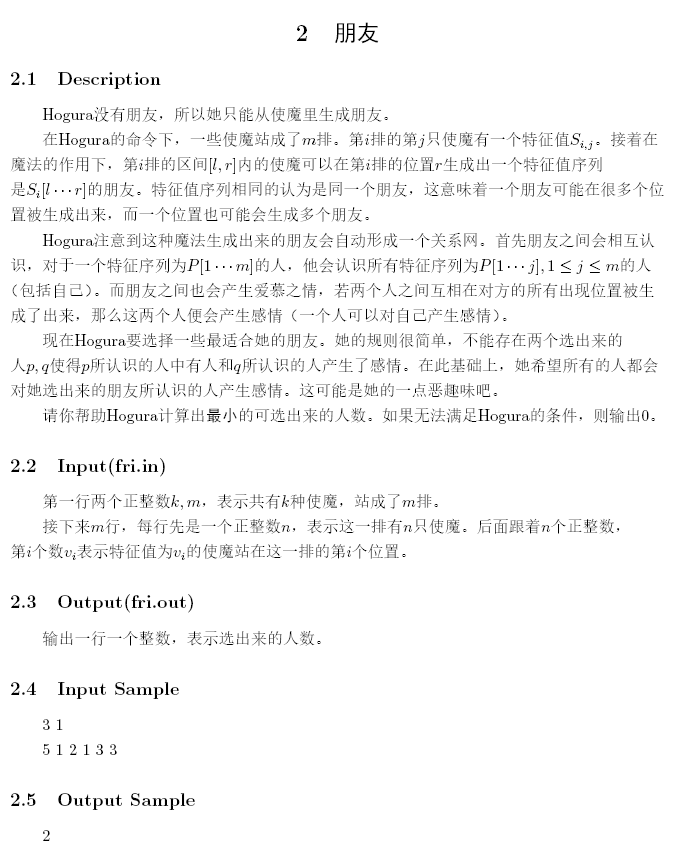
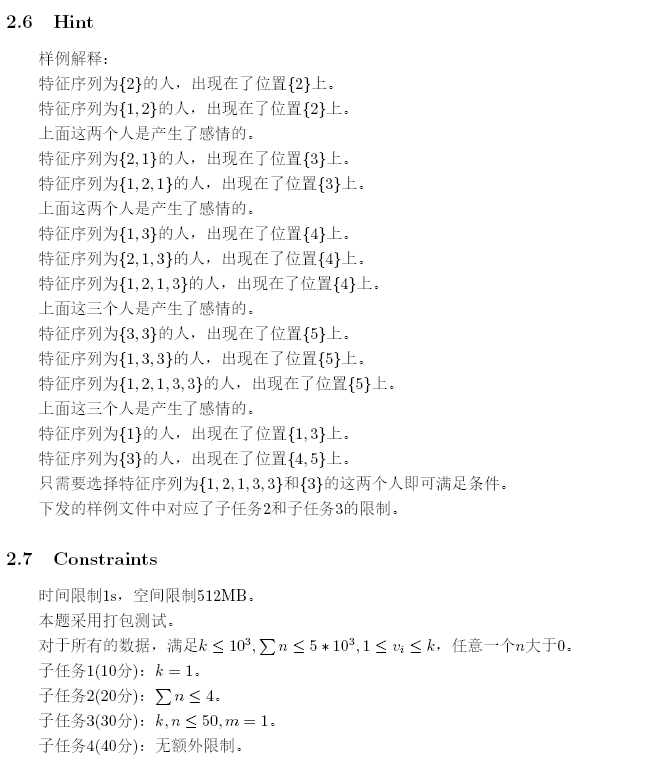

首先不要被这题面吓到......
他说出现位置完全相同,好像似曾相识的样子啊,等等,这不就是后缀自动机的节点的right集合的性质吗?
所以第一个条件就是说我们不能在根节点到其他点的一条链上选出两个人。
第二个条件就是我们需要找一些链覆盖所有节点。
好的,建立广义SAM然后跑最小链覆盖不就好了。
无解什么鬼啊?怕不是炸胡,样例没有我也构造不出来,不管他了QAQ。
于是这样你就get到了30分......
为什么?显然一个人认识的人并不是在一般的一条链上,而是在从根节点到这个点的一条链。
也就是说,我们最小链覆盖的所有链都必须从根节点的后继节点开始。
这东西最小链覆盖没法做了,我们需要拆点然后跑有上下界的最小流。
最小流怎么办?首先先随便找出一条可行流,拆掉超级源超级汇和inf边,再由汇点向源点退流,减去退掉的流量就好了。
考场30分代码:

1 #include<iostream> 2 #include<cstdio> 3 #include<cstring> 4 #include<algorithm> 5 #include<map> 6 #include<queue> 7 #define debug cout 8 using namespace std; 9 const int maxn=5e3+1e2; 10 const int inf=0x3f3f3f3f; 11 12 int in[maxn],n,ans; 13 14 namespace NetworkFlow { 15 int s[maxn<<2],t[maxn<<6],nxt[maxn<<6],f[maxn<<6],dep[maxn<<2]; 16 int st,ed; 17 inline void coredge(int from,int to,int flow) { 18 static int cnt = 1; 19 t[++cnt] = to , f[cnt] = flow , 20 nxt[cnt] = s[from] , s[from] = cnt; 21 } 22 inline void singledge(int from,int to,int flow) { 23 coredge(from,to,flow) , coredge(to,from,0); 24 } 25 inline bool bfs() { 26 memset(dep,-1,sizeof(dep)) , dep[st] = 0; 27 queue<int> q; q.push(st); 28 while( q.size() ) { 29 const int pos = q.front(); q.pop(); 30 for(int at=s[pos];at;at=nxt[at]) 31 if( f[at] && !~dep[t[at]] ) 32 dep[t[at]] = dep[pos] + 1 , q.push(t[at]); 33 } 34 return ~dep[ed]; 35 } 36 inline int dfs(int pos,int flow) { 37 if( pos == ed ) return flow; 38 int ret = 0 , now = 0; 39 for(int at=s[pos];at;at=nxt[at]) 40 if( f[at] && dep[t[at]] > dep[pos] ) { 41 now = dfs(t[at],min(flow,f[at])) , 42 ret += now , flow -= now , 43 f[at] -= now , f[at^1] += now; 44 if( !flow ) return ret; 45 } 46 if( !ret ) dep[pos] = -1; 47 return ret; 48 } 49 inline int dinic() { 50 int ret = 0 , now = 0; 51 while( bfs() ) { 52 while( ( now = dfs(st,inf) ) ) 53 ret += now; 54 } 55 return ret; 56 } 57 } 58 59 namespace SAM { 60 map<int,int> ch[maxn<<1]; 61 int fa[maxn<<1],len[maxn<<1],root,last,cnt; 62 63 inline int NewNode(int ll) { 64 len[++cnt] = ll; 65 return cnt; 66 } 67 inline void extend(int x) { 68 int p = last; 69 int np = NewNode(len[p]+1); 70 while( p && ch[p].find(x) == ch[p].end() ) ch[p][x] = np , p = fa[p]; 71 if( !p ) fa[np] = root; 72 else { 73 int q = ch[p][x]; 74 if( len[q] == len[p] + 1 ) fa[np] = q; 75 else { 76 int nq = NewNode(len[p]+1); 77 ch[nq] = ch[q] , fa[nq] = fa[q]; 78 fa[np] = fa[q] = nq; 79 while( p && ch[p][x] == q ) ch[p][x] = nq , p = fa[p]; 80 } 81 } 82 last = np; 83 } 84 inline void Ex_extend(int* sou,int li) { 85 last = root; 86 for(int i=1;i<=li;i++) { 87 if( ch[last].find(sou[i]) != ch[last].end() ) last = ch[last][sou[i]]; 88 else extend(sou[i]); 89 } 90 } 91 } 92 93 inline void build() { 94 using SAM::ch;using SAM::cnt; 95 using NetworkFlow::singledge; using NetworkFlow::st; using NetworkFlow::ed; 96 st = cnt * 2 + 1 , ed = st + 1; 97 #define cov(x) (x+cnt) 98 for(int i=1;i<=cnt;i++) { 99 singledge(st,i,1) , singledge(cov(i),ed,1); 100 for(map<int,int>::iterator it=ch[i].begin();it!=ch[i].end();++it) 101 singledge(i,cov(it->second),1); 102 } 103 ans = cnt; 104 } 105 106 int main() { 107 static int k,m; 108 SAM::root = SAM::NewNode(0); 109 scanf("%d%d",&k,&m); 110 if( k == 1 ) return puts("1"),0; 111 while(m--) { 112 scanf("%d",&n); 113 for(int i=1;i<=n;i++) scanf("%d",in+i); 114 SAM::Ex_extend(in,n); 115 } 116 build(); 117 ans -= NetworkFlow::dinic(); 118 printf("%d\n",ans); 119 return 0; 120 }
正解代码:

1 #include<iostream> 2 #include<cstdio> 3 #include<cstring> 4 #include<algorithm> 5 #include<map> 6 #include<queue> 7 #define debug cout 8 using namespace std; 9 const int maxn=5e3+1e2; 10 const int inf=0x3f3f3f3f; 11 12 int in[maxn],n,ans,sum; 13 14 namespace NetworkFlow { 15 int s[maxn<<2],t[maxn<<6],nxt[maxn<<6],f[maxn<<6],dep[maxn<<2],deg[maxn<<2],cnt=1; 16 int bak[maxn<<2],bcnt; 17 int st,ed,_s,_t; 18 inline void coredge(int from,int to,int flow) { 19 t[++cnt] = to , f[cnt] = flow , 20 nxt[cnt] = s[from] , s[from] = cnt; 21 } 22 inline void singledge(int from,int to,int flow) { 23 coredge(from,to,flow) , coredge(to,from,0); 24 } 25 inline bool bfs() { 26 memset(dep,-1,sizeof(dep)) , dep[st] = 0; 27 queue<int> q; q.push(st); 28 while( q.size() ) { 29 const int pos = q.front(); q.pop(); 30 for(int at=s[pos];at;at=nxt[at]) 31 if( f[at] && !~dep[t[at]] ) { 32 dep[t[at]] = dep[pos] + 1 , q.push(t[at]); 33 } 34 } 35 return ~dep[ed]; 36 } 37 inline int dfs(int pos,int flow) { 38 if( pos == ed ) return flow; 39 int ret = 0 , now = 0; 40 for(int at=s[pos];at;at=nxt[at]) 41 if( f[at] && dep[t[at]] > dep[pos] ) { 42 now = dfs(t[at],min(flow,f[at])) , 43 ret += now , flow -= now , 44 f[at] -= now , f[at^1] += now; 45 if( !flow ) return ret; 46 } 47 if( !ret ) dep[pos] = -1; 48 return ret; 49 } 50 inline int dinic() { 51 int ret = 0 , now = 0; 52 while( bfs() ) { 53 while( ( now = dfs(st,inf) ) ) 54 ret += now; 55 } 56 return ret; 57 } 58 inline int findflow() { 59 for(int at=s[_t];at;at=nxt[at]) 60 if( t[at] = _s ) return f[at^1]; 61 throw "It shouldn't be here"; 62 } 63 inline void backup() { 64 memcpy(bak,s,sizeof(s)) , bcnt = cnt; 65 } 66 inline void restore() { 67 memcpy(s,bak,sizeof(bak)) , cnt = bcnt; 68 } 69 } 70 71 namespace SAM { 72 map<int,int> ch[maxn<<1]; 73 int fa[maxn<<1],len[maxn<<1],root,last,cnt; 74 75 inline int NewNode(int ll) { 76 len[++cnt] = ll; 77 return cnt; 78 } 79 inline void extend(int x) { 80 int p = last; 81 int np = NewNode(len[p]+1); 82 while( p && ch[p].find(x) == ch[p].end() ) ch[p][x] = np , p = fa[p]; 83 if( !p ) fa[np] = root; 84 else { 85 int q = ch[p][x]; 86 if( len[q] == len[p] + 1 ) fa[np] = q; 87 else { 88 int nq = NewNode(len[p]+1); 89 ch[nq] = ch[q] , fa[nq] = fa[q]; 90 fa[np] = fa[q] = nq; 91 while( p && ch[p][x] == q ) ch[p][x] = nq , p = fa[p]; 92 } 93 } 94 last = np; 95 } 96 inline void Ex_extend(int* sou,int li) { 97 last = root; 98 for(int i=1;i<=li;i++) { 99 if( ch[last].find(sou[i]) != ch[last].end() ) last = ch[last][sou[i]]; 100 else extend(sou[i]); 101 } 102 } 103 } 104 105 inline void build() { 106 using SAM::ch;using SAM::cnt; 107 using namespace NetworkFlow; 108 _s = cnt * 2 + 1 , _t = _s + 1 , st = _t + 1 , ed = st + 1; 109 #define cov(x) (x+cnt) 110 for(int i=1;i<=cnt;i++) { 111 if( i != 1 ) ++deg[i] , --deg[cov(i)]; 112 for(map<int,int>::iterator it=ch[i].begin();it!=ch[i].end();it++) { 113 const int tar = it->second; 114 if( i == 1 ) singledge(_s,tar,1); 115 else singledge(cov(i),tar,1); 116 } 117 if( i != 1 ) singledge(cov(i),_t,1); 118 } 119 backup(); 120 for(int i=1;i<=_t;i++) { 121 if( !deg[i] ) continue; 122 if( deg[i] > 0 ) singledge(i,ed,deg[i]) , sum += deg[i]; 123 else singledge(st,i,-deg[i]); 124 } 125 singledge(_t,_s,inf); 126 } 127 inline int getans() { 128 using namespace NetworkFlow; 129 int d = dinic(); 130 if( d != sum ) return 0; // No solution . 131 int ret = findflow(); 132 restore(); 133 st = _t , ed = _s; 134 int dd = dinic(); 135 return ret - dd; 136 } 137 138 int main() { 139 static int k,m; 140 SAM::root = SAM::NewNode(0); 141 scanf("%d%d",&k,&m); 142 if( k == 1 ) return puts("1"),0; 143 while(m--) { 144 scanf("%d",&n); 145 for(int i=1;i<=n;i++) scanf("%d",in+i); 146 SAM::Ex_extend(in,n); 147 } 148 build(); 149 ans = getans(); 150 printf("%d\n",ans); 151 return 0; 152 }
T3:
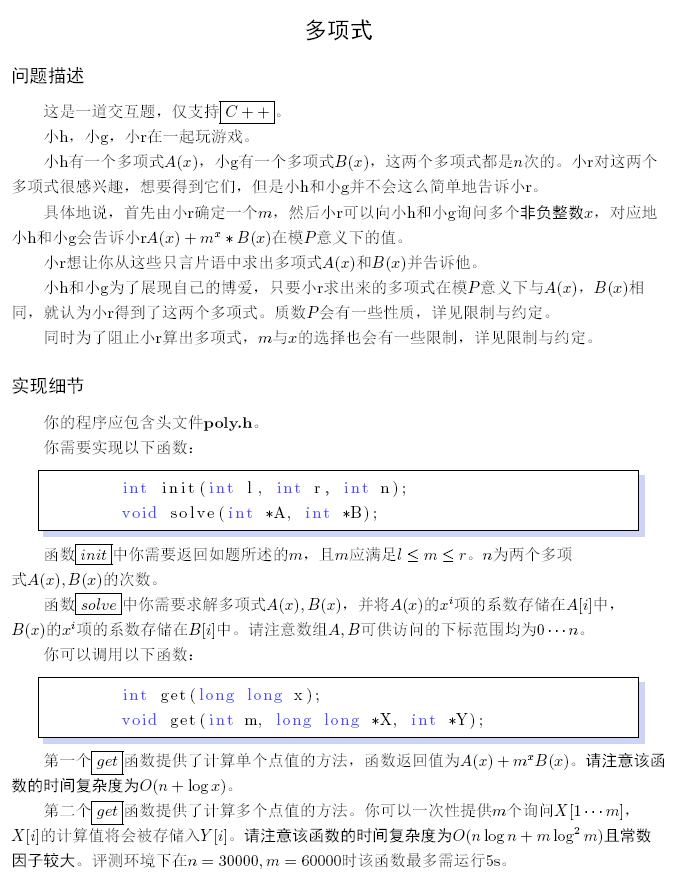

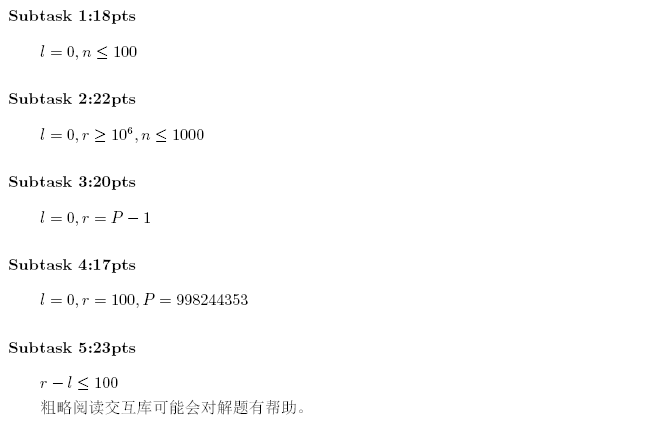
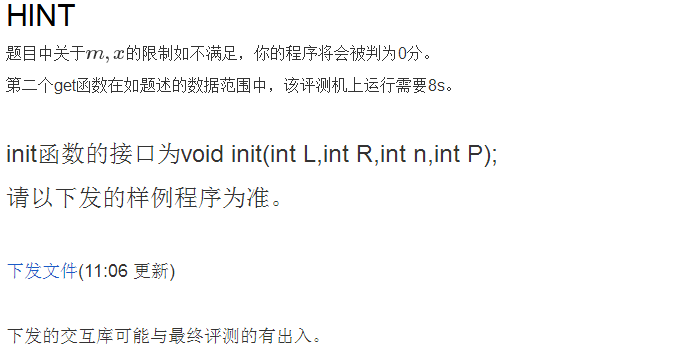
人生第一道交互题啊......
一看又是神仙题,好的,既然算出一个多项式有40%的分,那我钦定m为0,扔掉b,让他帮我插值,我直接NTT求解A好了。
什么?他没告诉我原根?好吧,我自己求。
求原根这种东西,反正就是把p-1先分解质因数,然后保证x^(p/div[i])在mod p意义下不为1就行了。
原根不能很大,暴力一个一个找就可以通过的说。
(一下为吐槽时间)
然后写了,调了,WA样例了......检查NTT,没错......输出插值用的x,没错......
自行插值他给的多项式,等等,怎么我计算出的值和他算出的不一样啊?
怕不是交互库WA了,去看通知,10:54有一个修正......
赶紧下载下来看看,woc怎么还是WA的?
改用单点插值看看,好,对了。
交互库WA了什么的,这是天不让我做题啊。
好的,单点插值交吧,反正大家都没法做就是了。
11:04,再次修正,这次交互库终于对了......
(吐槽时间结束)
官方题解放上来吧,真·神仙打架(蒟蒻只能瑟瑟发抖):
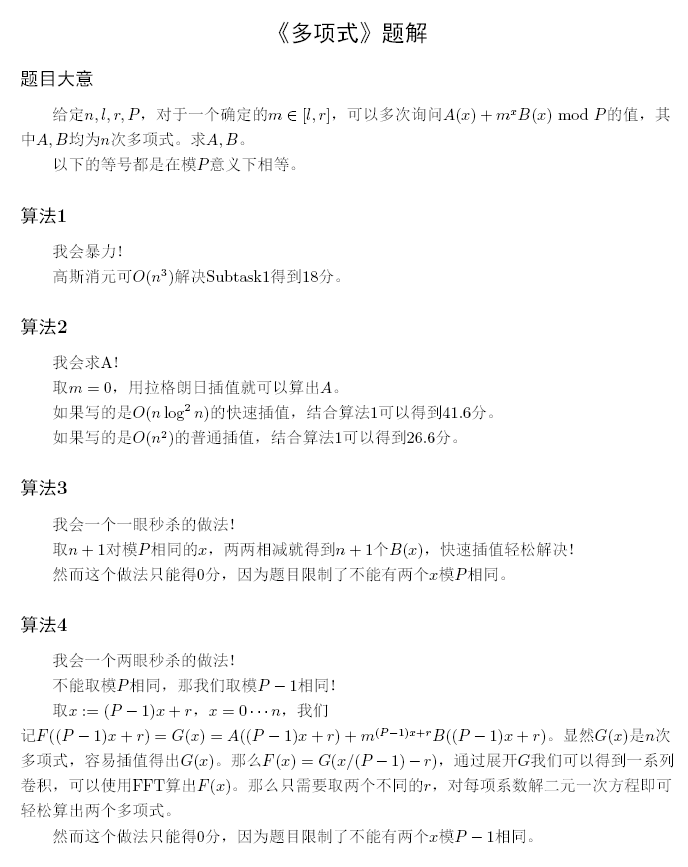

考场31分代码:

1 #include<iostream> 2 #include<cstdio> 3 #include<cstring> 4 #include<algorithm> 5 #include"poly.h" 6 //#define fixed 7 typedef long long int lli; 8 using namespace std; 9 const int maxn=65539; 10 11 int mod,g,len,n; 12 lli ans[maxn],tp[maxn]; 13 int oty[maxn]; 14 15 inline lli fastpow(lli base,int tim) { 16 lli ret = 1; 17 while( tim ) { 18 if( tim & 1 ) ret = ret * base % mod; 19 if( tim >>= 1 ) base = base * base % mod; 20 } 21 return ret % mod; 22 } 23 inline void NTT(lli* dst,int n,int ope) { 24 for(int i=0,j=0;i<n;i++) { 25 if( i < j ) swap( dst[i] , dst[j] ); 26 for(int t=n>>1;(j^=t)<t;t>>=1) ; 27 } 28 for(int len=2;len<=n;len<<=1) { 29 const int h = len >> 1; 30 lli per = fastpow(g,mod/(len)); 31 if( !~ope ) per = fastpow(per,mod-2); 32 for(int st=0;st<n;st+=len) { 33 lli w = 1; 34 for(int pos=0;pos<h;pos++) { 35 const lli u = dst[st+pos] , v = dst[st+pos+h] * w % mod; 36 dst[st+pos] = ( u + v ) % mod , 37 dst[st+pos+h] = ( u - v + mod ) % mod , 38 w = w * per % mod; 39 } 40 } 41 } 42 if( !~ope ) { 43 const lli mul = fastpow(n,mod-2); 44 for(int i=0;i<n;i++) dst[i] = dst[i] * mul % mod; 45 } 46 } 47 48 namespace FindRoot { 49 int divs[maxn],cnt; 50 inline void cut(int x) { 51 for(int i=2;(lli)i*i<=x;i++) 52 if( ! ( x % i ) ) { 53 divs[++cnt] = i; 54 while( ! ( x % i ) ) x /= i; 55 } 56 } 57 inline bool judge(int x) { 58 for(int i=1;i<=cnt;i++) 59 if( fastpow(x,mod/divs[i]) == 1 ) return 0; 60 return 1; 61 } 62 inline int findrt() { 63 cut(mod-1); 64 for(int i=2;i<mod;i++) if( judge(i) ) return i; 65 throw "There is no primary root ! "; 66 } 67 } 68 69 int init(int l,int r,int _n,int P) { 70 ++_n; 71 for(len=1;len<=_n;len<<=1) ; 72 mod = P , n = _n , g = FindRoot::findrt(); 73 return 0; 74 } 75 void solve(int *A,int *B) { 76 for(int i=0;i<len;i++) tp[i] = fastpow(g,(mod/len)*i); 77 //#ifdef fixed 78 for(int i=len;i;i--) tp[i] = tp[i-1]; 79 get(len,tp,oty); 80 for(int i=0;i<len;i++) ans[i] = oty[i+1]; 81 /*#else 82 for(int i=0;i<len;i++) ans[i] = get(tp[i]); 83 #endif*/ 84 NTT(ans,len,-1); 85 for(int i=0;i<n;i++) A[i] = B[i] = ans[i]; 86 }
某不科学的超(时)std(卡评测8分钟的说):

1 #include <bits/stdc++.h> 2 using namespace std; 3 #define rep(i,a,b) for (int i = a, _ = b; i <= _; i ++) 4 #define per(i,a,b) for (int i = a, _ = b; i >= _; i --) 5 #define For(i,a,b) for (int i = a, _ = b; i < _; i ++) 6 7 #include <ext/pb_ds/assoc_container.hpp> 8 #include <ext/pb_ds/hash_policy.hpp> 9 10 #include "poly.h" 11 12 typedef long long ll; 13 14 int mod, g; 15 16 namespace Interpolation { 17 18 #define iter(i, n) for (int i = 1; i <= n; ++i) 19 #define iter0(i, n) for (int i = 0; i < n; ++i) 20 #define forw(i, a, b) for (int i = a; i <= b; ++i) 21 #define down(i, a, b) for (int i = b; i >= a; --i) 22 23 #define reset(a, l, r) forw(i, l, r) a[i] = 0; 24 #define NR 401000 25 26 typedef vector<int> Poly; 27 28 inline int pr(int a, int z) { 29 int s = 1; 30 while (z > 0) { 31 if (z % 2 == 1) s = 1ll * s * a % mod; 32 a = 1ll * a * a % mod; 33 z /= 2; 34 } 35 return s; 36 } 37 38 inline int mod_inv(int a) { return pr(a, mod - 2); } 39 40 void fft(int *a, int n, int ty) { 41 for (int i = n >> 1, j = 1, k; j < n - 1; ++j) { 42 if (i > j) swap(a[i], a[j]); 43 for (k = n >> 1; k <= i; k >>= 1) i ^= k; 44 i ^= k; 45 } 46 47 for (int m = 2; m <= n; m <<= 1) { 48 int h = m >> 1, wm = pr(g, (mod - 1) / m * (ty == +1 ? 1 : (m - 1))); 49 50 for (register int i = 0; i < n; i += m) { 51 register int w = 1; 52 for (int j = i; j < i + h; ++j) { 53 register int u = a[j], v = 1ll * w * a[j + h] % mod; 54 55 a[j] = (u + v) % mod; 56 a[j + h] = (u - v + mod) % mod; 57 w = 1ll * w * wm % mod; 58 } 59 } 60 } 61 62 if (ty == -1) { 63 int iv = mod_inv(n); 64 iter0(i, n) a[i] = 1ll * a[i] * iv % mod; 65 } 66 } 67 68 ostream& operator<<(ostream &output, const Poly &a){ 69 output << "["; 70 int la = a.size(); 71 iter0(i, la) 72 output << a[i] << (i + 1 == la ? ']' : ','); 73 return output; 74 } 75 76 void upd(Poly &a) { while (!a.empty() && a.back() == 0) a.pop_back(); } 77 78 inline Poly operator+(const Poly &a, const Poly &b) { 79 int la = a.size(), lb = b.size(); 80 int lc = max(la, lb); 81 Poly c(lc); 82 iter0(i, lc) c[i] = ((i < la ? a[i] : 0) + (i < lb ? b[i] : 0)) % mod; 83 return upd(c), c; 84 } 85 inline void poly_multo(int a[], int b[], int N) { 86 fft(a, N, +1), fft(b, N, +1); 87 iter0(i, N) a[i] = 1ll * a[i] * b[i] % mod; 88 fft(a, N, -1); 89 } 90 91 int ta[NR], tb[NR]; 92 93 Poly operator*(const Poly &a, const Poly &b) { 94 int la = a.size(), lb = b.size(); 95 96 Poly c(la + lb - 1); 97 98 if (la + lb <= 100) { 99 iter0(i, la) iter0(j, lb) c[i + j] = (c[i + j] + 1ll * a[i] * b[j]) % mod; 100 } else { 101 int N; 102 for (N = 1; N < la + lb; N <<= 1); 103 iter0(i, N) { 104 ta[i] = (i < la ? a[i] : 0); 105 tb[i] = (i < lb ? b[i] : 0); 106 } 107 poly_multo(ta, tb, N); 108 iter0(i, la + lb - 1) c[i] = ta[i]; 109 } 110 return upd(c), c; 111 } 112 int ccc = 0; 113 int ti[NR]; 114 115 void poly_inv(int *f, int *inv, int n) { 116 if (n == 0) { 117 inv[0] = mod_inv(f[0]); 118 return; 119 } 120 poly_inv(f, inv, n / 2); 121 static int t[140000]; 122 int N = 1; 123 for (; N <= n * 2; N <<= 1); 124 iter0(i, N) t[i] = i <= n ? f[i] : 0; reset(inv, n / 2 + 1, N); 125 fft(inv, N, +1); fft(t, N, +1); 126 iter0(i, N) inv[i] = (2 + mod - 1ll * inv[i] * t[i] % mod) * inv[i] % mod; 127 fft(inv, N, -1); 128 } 129 130 void poly_mod(int *a, int *b, int *c, int n, int m) { 131 if (n < m) { 132 iter0(i, m) c[i] = i <= n ? a[i] : 0; 133 return; 134 } 135 static int f[140000], g[140000]; 136 if (n < 100) { 137 int invb = mod_inv(b[m]); 138 memcpy(f, a, sizeof(int) * (n + 1)); 139 down(i, n, m) { 140 int t = 1ll * f[i] * invb % mod; 141 forw(j, 0, m) (f[i - j] += mod - 1ll * t * b[m - j] % mod) %= mod; 142 } 143 memcpy(c, f, sizeof(int) * m); 144 return; 145 } 146 147 int N; 148 for (N = 1; N <= max(n, 2 * (n - m)) + 10; N <<= 1); 149 reset(g, 0, N); 150 151 forw(i, 0, n - m) f[i] = i <= m ? b[m - i] : 0; reset(f, n - m + 1, N); 152 poly_inv(f, g, n - m); reset(g, n - m + 1, N); 153 forw(i, 0, n - m) f[i] = a[n - i]; 154 poly_multo(g, f, N); 155 reset(g, n - m + 1, N); 156 reverse(g, g + n - m + 1); 157 forw(i, 0, m) f[i] = b[i]; reset(f, m + 1, N); 158 poly_multo(f, g, N); 159 iter0(i, m) c[i] = (a[i] + mod - f[i]) % mod; 160 } 161 int tr[NR]; 162 163 Poly operator%(const Poly &a, const Poly &b) { 164 165 int la = a.size(), lb = b.size(), N; 166 Poly c(lb); 167 for (N = 1; N < la + lb; N <<= 1); 168 iter0(i, N) { 169 ta[i] = (i < la ? a[i] : 0); 170 tb[i] = (i < lb ? b[i] : 0); 171 } 172 poly_mod(ta, tb, tr, la - 1, lb - 1); 173 174 iter0(i, lb) c[i] = tr[i]; 175 iter0(i, N) tr[i] = 0; 176 upd(c); 177 178 return c; 179 } 180 Poly t[NR], tt[NR]; 181 int tsz, lc[NR], rc[NR]; 182 183 184 void init(int &x, int l, int r, int *a) { 185 x = ++tsz; 186 if (l == r) { 187 t[x] = { (mod - a[l]) % mod, 1 }; 188 return; 189 } 190 int mid = (l + r) / 2; 191 init(lc[x], l, mid, a); 192 init(rc[x], mid + 1, r, a); 193 t[x] = t[lc[x]] * t[rc[x]]; 194 } 195 196 int eval(const Poly &A, int x) { 197 int p = 1, res = 0; 198 for (auto it = A.begin(); it != A.end(); ++it) { 199 res = (res + 1ll * p * *it) % mod; 200 p = 1ll * p * x % mod; 201 } 202 return res; 203 } 204 205 int pp[NR]; 206 207 Poly D(const Poly &a) { 208 int la = a.size(); 209 Poly c(la - 1); 210 iter(i, la - 1) c[i - 1] = 1ll * i * a[i] % mod; 211 return c; 212 } 213 214 void s2(int x, int l, int r, const Poly &f, int qX[], int ans[]) { 215 if (f.size() < 1000 || r - l + 1 <= 200) { 216 forw(i, l, r) pp[i] = 1; 217 for (auto it = f.begin(); it != f.end(); ++it) { 218 forw(i, l, r) { 219 ans[i] = (ans[i] + 1ll * pp[i] * *it) % mod; 220 pp[i] = 1ll * pp[i] * qX[i] % mod; 221 } 222 } 223 return; 224 } 225 226 int mid = (l + r) / 2; 227 s2(lc[x], l, mid, f % t[lc[x]], qX, ans); 228 s2(rc[x], mid + 1, r, f % t[rc[x]], qX, ans); 229 } 230 int root; 231 232 233 234 void evaluation(const Poly &f, bool inited, int qX[], int ans[], int m) { 235 if (!inited) { 236 tsz = 0; 237 init(root, 1, m, qX); 238 } 239 s2(root, 1, m, f, qX, ans); 240 241 } 242 243 int px[NR], py[NR], qx[NR], qy[NR], Q[NR], n, m; 244 245 Poly s1(int x, int l, int r) { 246 if (l == r) { 247 Poly tmp = { (int) (1ll * py[l] * mod_inv(Q[l]) % mod) }; 248 return tmp; 249 } 250 int mid = (l + r) / 2; 251 Poly L = s1(lc[x], l, mid), R = s1(rc[x], mid + 1, r); 252 return L * t[rc[x]] + R * t[lc[x]]; 253 } 254 255 Poly interpolation(int m, long long *x, int *y) { 256 n = m; 257 for (int i = 1; i <= n; i ++) 258 px[i] = x[i] % mod, py[i] = y[i]; 259 init(root, 1, n, px); 260 evaluation(D(t[1]), true, px, Q, n); 261 return s1(root, 1, n); 262 } 263 264 } 265 266 inline int rnd() { 267 if (RAND_MAX < mod) 268 return rand() << 15 | rand(); 269 else 270 return rand(); 271 } 272 273 inline int Pow(ll a, ll b, int p = mod) { 274 int t = 1; 275 //b %= p - 1; 276 a %= p; 277 while (b) { 278 if (b & 1) t = 1ll * t * a % p; 279 a = 1ll * a * a % p, b >>= 1; 280 } 281 return t; 282 } 283 284 inline bool check(int x, int k) { 285 return (mod - 1) % k == 0 && k != mod - 1 && Pow(x, k) == 1; 286 } 287 288 inline int get_root() { 289 for (int r = 2;; r ++) { 290 int flag = 1; 291 for (int k = 1; 1ll * k * k <= mod; k ++) { 292 if (check(r, k) || check(r, (mod - 1) / k)) { 293 flag = 0; 294 break; 295 } 296 } 297 if (flag) return r; 298 } 299 } 300 301 inline int get_log(int a, int x) { 302 static __gnu_pbds::gp_hash_table<int, int> ms; 303 ms.clear(); 304 int m = int(sqrt(mod) + 0.5); 305 int t = 1, xx = Pow(a, m); 306 rep (i , 0 , mod / m + 1) { 307 if (ms.find(t) == ms.end()) ms[t] = i; 308 t = 1ll * t * xx % mod; 309 } 310 //cerr << ms.size() << endl; 311 t = Pow(a, mod - 2); 312 //assert(1ll * a * t % mod == 1); 313 rep (i , 0 , m) { 314 if (ms.find(x) != ms.end()) 315 return ms[x] * m + i; 316 x = 1ll * x * t % mod; 317 } 318 assert(0); 319 return -1; 320 } 321 322 const int maxn = 100007; 323 324 int n, m; 325 ll x[maxn]; 326 int y[maxn]; 327 328 int init(int l, int r, int _n, int P) { 329 //auto st = clock(); 330 srand(time(0)); 331 n = _n; 332 mod = P; 333 g = get_root(); 334 for (;;) { 335 m = rnd() % (r - l + 1) + l; 336 int z = get_log(g, m); 337 if (z & 1) { 338 //cerr << "init time: " << (clock() - st) / 1000.0 << endl; 339 return m; 340 } 341 } 342 } 343 344 void solve(int *A, int *B) { 345 //auto st = clock(); 346 347 int k2 = 1, k1 = mod - 1; 348 while (k1 % 2 == 0) k1 >>= 1, k2 <<= 1; 349 int N = n + 1 + (((n + 1) & 1) ^ 1); 350 int a = get_log(g, m), c = N % (mod - 1); 351 assert(Pow(g, a) == m); 352 int _a = Pow(a % k2, k2 / 2 - 1, k2); 353 assert(1ll * _a * a % k2 == 1); 354 for (int d = 1, i = 1; i <= n + N + 1; d += 2, i ++) { 355 int b = 1ll * c * d % k2 * _a % k2; 356 //int _d = Pow(g, 1ll * d * k1); 357 ll _d = 1ll * d * k1; 358 ll _b = 1ll * b * k1 % mod; 359 assert(1ll * a * _b % (k1 * k2) == 1ll * c * _d % (k1 * k2)); 360 _d = Pow(g, _d); 361 x[i] = 1ll * _b * mod - 1ll * _d * (mod - 1); 362 if (x[i] < 0) x[i] += 1ll * mod * (mod - 1); 363 assert(x[i] % mod == _d); 364 assert(x[i] % (mod - 1) == _b); 365 assert(Pow(x[i], N) == Pow(m, x[i])); 366 } 367 368 //cerr << "get x time: " << (clock() - st) / 1000.0 << endl; 369 370 //st = clock(); 371 get(n + N + 1, x, y); 372 //get(n, x, y); 373 //get(N + 1, x + n, y + n); 374 //cerr << "get y time: " << (clock() - st) / 1000.0 << endl; 375 376 //st = clock(); 377 auto F = Interpolation::interpolation(n + N + 1, x, y); 378 //cerr << "get F time: " << (clock() - st) / 1000.0 << endl; 379 380 rep (i , 0 , n) A[i] = F[i]; 381 rep (i , N , N + n) B[i - N] = F[i]; 382 }
交互库:

1 #include <bits/stdc++.h> 2 3 #include "poly.h" 4 5 using namespace std; 6 7 #define ER_TOKEN "WA" 8 #define WA_TOKEN "WA" 9 #define HF_TOKEN "HF" 10 #define AC_TOKEN "AC" 11 #define ED_TOKEN "ED" 12 13 inline static void halt(int value = 0) 14 { 15 printf(ED_TOKEN); 16 exit(value); 17 } 18 19 namespace Variants { 20 21 const char fin [] = "poly.in"; 22 const char fout[] = "poly.out"; 23 24 const int maxN = 100000 + 7; 25 26 static int mod = 998244353, g = 3; 27 28 static int n, L, R, m; 29 static int A[maxN], B[maxN], resA[maxN], resB[maxN]; 30 31 inline static int Pow(int a, long long b) 32 { 33 int t = 1; 34 for (/*b %= mod - 1*/; b; b >>= 1, a = 1ll * a * a % mod) 35 if (b & 1) 36 t = 1ll * t * a % mod; 37 return t; 38 } 39 40 inline static bool check(int x, int k) 41 { 42 return (mod - 1) % k == 0 && k != mod - 1 && Pow(x, k) == 1; 43 } 44 45 inline static void get_root() 46 { 47 for (g = 2;; g ++) 48 { 49 int flag = 1; 50 for (int k = 1; 1ll * k * k <= mod; k ++) 51 if (check(g, k) || check(g, (mod - 1) / k)) 52 { 53 flag = 0; 54 break; 55 } 56 if (flag) 57 return; 58 } 59 } 60 61 inline static void check(long long x) 62 { 63 static map<int, int> ms1, ms2; 64 65 if (ms1[x % mod]) 66 { 67 puts(ER_TOKEN); 68 printf("%d mod P exists twice.\n", int(x % mod)); 69 halt(1); 70 } 71 ms1[x % mod] = 1; 72 if (ms2[x % (mod - 1)]) 73 { 74 puts(ER_TOKEN); 75 printf("%d mod P-1 exists twice.\n", int(x % (mod-1))); 76 halt(1); 77 } 78 ms2[x % (mod - 1)] = 1; 79 } 80 81 } 82 83 using namespace Variants; 84 85 namespace Interpol { 86 87 #define iter(i, n) for (int i = 1; i <= n; ++i) 88 #define iter0(i, n) for (int i = 0; i < n; ++i) 89 #define forw(i, a, b) for (int i = a; i <= b; ++i) 90 #define down(i, a, b) for (int i = b; i >= a; --i) 91 92 #define reset(a, l, r) forw(i, l, r) a[i] = 0; 93 #define NR 401000 94 95 typedef vector<int> Poly; 96 97 inline int pr(int a, int z) { 98 int s = 1; 99 while (z > 0) { 100 if (z % 2 == 1) s = 1ll * s * a % mod; 101 a = 1ll * a * a % mod; 102 z /= 2; 103 } 104 return s; 105 } 106 107 inline int mod_inv(int a) { return pr(a, mod - 2); } 108 109 void fft(int *a, int n, int ty) { 110 for (int i = n >> 1, j = 1, k; j < n - 1; ++j) { 111 if (i > j) swap(a[i], a[j]); 112 for (k = n >> 1; k <= i; k >>= 1) i ^= k; 113 i ^= k; 114 } 115 116 for (int m = 2; m <= n; m <<= 1) { 117 int h = m >> 1, wm = pr(g, (mod - 1) / m * (ty == +1 ? 1 : (m - 1))); 118 119 for (register int i = 0; i < n; i += m) { 120 register int w = 1; 121 for (int j = i; j < i + h; ++j) { 122 register int u = a[j], v = 1ll * w * a[j + h] % mod; 123 124 a[j] = (u + v) % mod; 125 a[j + h] = (u - v + mod) % mod; 126 w = 1ll * w * wm % mod; 127 } 128 } 129 } 130 131 if (ty == -1) { 132 int iv = mod_inv(n); 133 iter0(i, n) a[i] = 1ll * a[i] * iv % mod; 134 } 135 } 136 137 ostream& operator<<(ostream &output, const Poly &a){ 138 output << "["; 139 int la = a.size(); 140 iter0(i, la) 141 output << a[i] << (i + 1 == la ? ']' : ','); 142 return output; 143 } 144 145 void upd(Poly &a) { while (!a.empty() && a.back() == 0) a.pop_back(); } 146 147 inline Poly operator+(const Poly &a, const Poly &b) { 148 int la = a.size(), lb = b.size(); 149 int lc = max(la, lb); 150 Poly c(lc); 151 iter0(i, lc) c[i] = ((i < la ? a[i] : 0) + (i < lb ? b[i] : 0)) % mod; 152 return upd(c), c; 153 } 154 inline void poly_multo(int a[], int b[], int N) { 155 fft(a, N, +1), fft(b, N, +1); 156 iter0(i, N) a[i] = 1ll * a[i] * b[i] % mod; 157 fft(a, N, -1); 158 } 159 160 int ta[NR], tb[NR]; 161 162 Poly operator*(const Poly &a, const Poly &b) { 163 int la = a.size(), lb = b.size(); 164 165 Poly c(la + lb - 1); 166 167 if (la + lb <= 100) { 168 iter0(i, la) iter0(j, lb) c[i + j] = (c[i + j] + 1ll * a[i] * b[j]) % mod; 169 } else { 170 int N; 171 for (N = 1; N < la + lb; N <<= 1); 172 iter0(i, N) { 173 ta[i] = (i < la ? a[i] : 0); 174 tb[i] = (i < lb ? b[i] : 0); 175 } 176 poly_multo(ta, tb, N); 177 iter0(i, la + lb - 1) c[i] = ta[i]; 178 } 179 return upd(c), c; 180 } 181 int ccc = 0; 182 int ti[NR]; 183 184 void poly_inv(int *f, int *inv, int n) { 185 if (n == 0) { 186 inv[0] = mod_inv(f[0]); 187 return; 188 } 189 poly_inv(f, inv, n / 2); 190 static int t[140000]; 191 int N = 1; 192 for (; N <= n * 2; N <<= 1); 193 iter0(i, N) t[i] = i <= n ? f[i] : 0; reset(inv, n / 2 + 1, N); 194 fft(inv, N, +1); fft(t, N, +1); 195 iter0(i, N) inv[i] = (2 + mod - 1ll * inv[i] * t[i] % mod) * inv[i] % mod; 196 fft(inv, N, -1); 197 } 198 199 void poly_mod(int *a, int *b, int *c, int n, int m) { 200 if (n < m) { 201 iter0(i, m) c[i] = i <= n ? a[i] : 0; 202 return; 203 } 204 static int f[140000], g[140000]; 205 if (n < 100) { 206 int invb = mod_inv(b[m]); 207 memcpy(f, a, sizeof(int) * (n + 1)); 208 down(i, n, m) { 209 int t = 1ll * f[i] * invb % mod; 210 forw(j, 0, m) (f[i - j] += mod - 1ll * t * b[m - j] % mod) %= mod; 211 } 212 memcpy(c, f, sizeof(int) * m); 213 return; 214 } 215 216 int N; 217 for (N = 1; N <= max(n, 2 * (n - m)) + 10; N <<= 1); 218 reset(g, 0, N); 219 220 forw(i, 0, n - m) f[i] = i <= m ? b[m - i] : 0; reset(f, n - m + 1, N); 221 poly_inv(f, g, n - m); reset(g, n - m + 1, N); 222 forw(i, 0, n - m) f[i] = a[n - i]; 223 poly_multo(g, f, N); 224 reset(g, n - m + 1, N); 225 reverse(g, g + n - m + 1); 226 forw(i, 0, m) f[i] = b[i]; reset(f, m + 1, N); 227 poly_multo(f, g, N); 228 iter0(i, m) c[i] = (a[i] + mod - f[i]) % mod; 229 } 230 int tr[NR]; 231 232 Poly operator%(const Poly &a, const Poly &b) { 233 234 int la = a.size(), lb = b.size(), N; 235 Poly c(lb); 236 for (N = 1; N < la + lb; N <<= 1); 237 iter0(i, N) { 238 ta[i] = (i < la ? a[i] : 0); 239 tb[i] = (i < lb ? b[i] : 0); 240 } 241 poly_mod(ta, tb, tr, la - 1, lb - 1); 242 243 iter0(i, lb) c[i] = tr[i]; 244 iter0(i, N) tr[i] = 0; 245 upd(c); 246 247 return c; 248 } 249 Poly t[NR], tt[NR]; 250 int tsz, lc[NR], rc[NR]; 251 252 253 void init(int &x, int l, int r, int *a) { 254 x = ++tsz; 255 if (l == r) { 256 t[x] = { (mod - a[l]) % mod, 1 }; 257 return; 258 } 259 int mid = (l + r) / 2; 260 init(lc[x], l, mid, a); 261 init(rc[x], mid + 1, r, a); 262 t[x] = t[lc[x]] * t[rc[x]]; 263 } 264 265 int eval(const Poly &A, int x) { 266 int p = 1, res = 0; 267 for (auto it = A.begin(); it != A.end(); ++it) { 268 res = (res + 1ll * p * *it) % mod; 269 p = 1ll * p * x % mod; 270 } 271 return res; 272 } 273 274 int pp[NR]; 275 276 Poly D(const Poly &a) { 277 int la = a.size(); 278 Poly c(la - 1); 279 iter(i, la - 1) c[i - 1] = 1ll * i * a[i] % mod; 280 return c; 281 } 282 283 void s2(int x, int l, int r, const Poly &f, int qX[], int ans[]) { 284 if (f.size() < 1000 || r - l + 1 <= 200) { 285 forw(i, l, r) pp[i] = 1; 286 for (auto it = f.begin(); it != f.end(); ++it) { 287 forw(i, l, r) { 288 ans[i] = (ans[i] + 1ll * pp[i] * *it) % mod; 289 pp[i] = 1ll * pp[i] * qX[i] % mod; 290 } 291 } 292 return; 293 } 294 295 int mid = (l + r) / 2; 296 s2(lc[x], l, mid, f % t[lc[x]], qX, ans); 297 s2(rc[x], mid + 1, r, f % t[rc[x]], qX, ans); 298 } 299 int root; 300 301 void evaluation(const Poly &f, bool inited, int qX[], int ans[], int m) { 302 if (!inited) { 303 tsz = 0; 304 init(root, 1, m, qX); 305 } 306 s2(root, 1, m, f, qX, ans); 307 308 } 309 310 int px[NR], py[NR], qx[NR], qy[NR], Q[NR], n, m; 311 312 Poly s1(int x, int l, int r) { 313 if (l == r) { 314 Poly tmp = { (int) (1ll * py[l] * mod_inv(Q[l]) % mod) }; 315 return tmp; 316 } 317 int mid = (l + r) / 2; 318 Poly L = s1(lc[x], l, mid), R = s1(rc[x], mid + 1, r); 319 return L * t[rc[x]] + R * t[lc[x]]; 320 } 321 322 } 323 324 int get(long long x) 325 { 326 check(x); 327 int res = 0, t = 1, m = Pow(Variants::m, x); 328 x %= mod; 329 for (int i = 0; i <= n; i ++) 330 { 331 (res += (1ll * m * B[i] % mod + A[i]) * t % mod) %= mod; 332 t = 1ll * t * x % mod; 333 } 334 return res; 335 } 336 337 void get(int m, long long *X, int *Y) 338 { 339 static int x[maxN], ya[maxN], yb[maxN]; 340 341 //auto st = clock(); 342 343 for (int i = 1; i <= m; i ++) 344 { 345 check(X[i]); 346 x[i] = X[i] % mod; 347 } 348 349 Interpol::Poly a; 350 a.resize(n + 1); 351 352 for (int i = 0; i <= n; i ++) 353 a[i] = A[i]; 354 Interpol::evaluation(a, false, x, ya, m); 355 356 for (int i = 0; i <= n; i ++) 357 a[i] = B[i]; 358 Interpol::evaluation(a, false, x, yb, m); 359 360 //cerr << "evaluate time: " << (clock() - st) / 1000.0 << endl; 361 362 //st = clock(); 363 for (int i = 1; i <= m; i ++) 364 Y[i] = (1ll * Pow(Variants::m, X[i]) * yb[i] % mod + ya[i]) % mod; 365 //cerr << "get Y[] time: " << (clock() - st) / 1000.0 << endl; 366 } 367 368 int main() 369 { 370 using namespace Variants; 371 freopen(fin , "r", stdin); 372 freopen(fout, "w", stdout); 373 374 scanf("%d%d%d%d", &n, &L, &R, &mod); 375 for (int i = 0; i <= n; i ++) 376 scanf("%d", &A[i]); 377 for (int i = 0; i <= n; i ++) 378 scanf("%d", &B[i]); 379 get_root(); 380 381 m = init(L, R, n, mod); 382 if (!(L <= m && m <= R)) 383 { 384 puts(WA_TOKEN); 385 printf("m=%d is not in [%d,%d]\n", m, L, R); 386 return 1; 387 } 388 solve(resA, resB); 389 390 int cntA = 0, cntB = 0; 391 for (int i = 0; i <= n; i ++) 392 { 393 cntA += (A[i] != resA[i] % mod); 394 cntB += (B[i] != resB[i] % mod); 395 } 396 397 /* 398 for (int i = 0; i <= n; i ++) 399 cerr << resA[i] << " "; cerr << endl; 400 for (int i = 0; i <= n; i ++) 401 cerr << resB[i] << " "; cerr << endl; 402 */ 403 404 if (cntA == 0 && cntB == 0) 405 puts(AC_TOKEN); 406 else if (cntA == 0 || cntB == 0) 407 { 408 puts(HF_TOKEN); 409 char c = cntA ? 'B' : 'A'; 410 printf("You answer polynomial %c correctly, the other one has %d different coefficients.\n", c, cntA + cntB); 411 halt(1); 412 } 413 else 414 { 415 puts(WA_TOKEN); 416 printf("Your polynomial A and B has %d and %d different coefficients.\n", cntA, cntB); 417 halt(1); 418 } 419 420 halt(); 421 return 0; 422 }
在大佬们看来的水题我才考这么几分,果然还是我太菜了呀。





 浙公网安备 33010602011771号
浙公网安备 33010602011771号